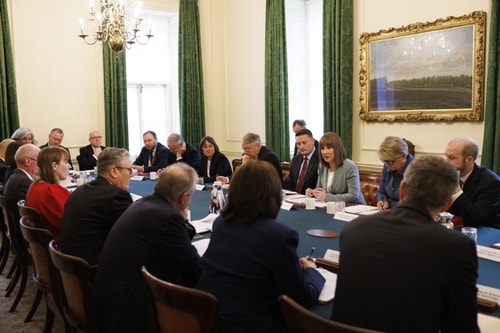Is your town one of the 75 local authorities set to receive ten-year funding to tackle social deprivation and promote community cohesion? If so, now is the time for your Christian outreach projects and local churches to engage and introduce what your ministry is doing in the community.
I was recently listening to Natalie Williams, chief executive of Jubliee+ (member organisation), on Simon Guillebaud’s podcast share her testimony and talk about the importance of local churches getting mercy and justice into the DNA of church ministry and discipleship.
Towards the end of the episode, Natalie shares encouragingly how churches nationwide are bringing evangelism and social action together in compassion ministries and support. Her rallying cry to the church is to set up ministries that move from “relief from individual’s poverty to release from their poverty”. Put another way, not only to offer hope to an individual’s immediate crisis – debt, food poverty, homelessness and all the adjacent issues connected poverty but also to offer hope to one’s eternal crisis; a life without Christ and the joy of knowing Him.
For generations, the local church has cared for those in living in poverty as the scriptures compel us to, and it will continue to do so. Politicians and government officials are acutely aware Christian charities and churches provide a safety net for many families and individuals across the UK. Whilst the government’s “Plan for Neighbourhoods” fund is not aimed at engaging Christian or other faith-based groups, we would argue it is important for evangelical churches and ministries to engage with it and shape local authorities’ investment and regeneration in communities because of their integral role played at local level.
The problem the Plan for Neighbourhoods fund is trying to resolve
The Plan for Neighbourhoods fund will form part of the government’s wider community cohesion strategy, due spring 2026. Through extensive research, the government and local authorities can see the correlation between living standards and economic strength. In communities where living standards are low, high levels of social deprivation and crime are by-products and community distrust in political authority is higher.
The government hope to achieve this by focusing on three goals:
1. Thriving places is about instilling local pride back into one’s community, high streets and housing estates. The government want to encourage local authorities and neighbourhood boards to design public services that are responsive to local needs.
2. Stronger communities is about tackling the root causes of social disorder and finding ways to bring the community together and ensure safer neighbourhoods.
3. Taking back control seeks to empower local people to shape decisions and programmes of local government.
The Labour government believe strongly that “places with stronger social capital have higher educational attainment, lower crime and faster economic growth”. Churches and Christian compassion ministries promote social capital and are themselves a network of support and positive relationships. The advocacy team will continue to speak positively about the role of local churches in communities and will encourage ministers and politicians to meet with Evangelical Alliance members to see firsthand the incredible work Jesus is doing through the church.
Fostering stronger, more well-connected communities, where people trust each other and feel a common identity improves resilience, cohesion and safety, tackling economic and social marginalisation.”

Is your place one of 75 local authorities set to receive this funding?
The government have set aside a £1.5 billion fund for 75 communities across England, Wales, Scotland and Northern Ireland where there are multiple deprivations. In real terms this is about £20 million to each place over ten years. Those 75 places are cited below:
Northern Ireland (2): Coleraine and Derry/Londonderry
Wales (5): Berry (Vale of Glamorgan), Cwmbrân, Merthyr Tydfil, Rhyl, Wrexham
Scotland (10): Arbroath, Clydebank, Coatbridge, Dumfries, Elgin, Greenock, Irvine, Kilmarnock, Orkney Islands (Kirkwall), Peterhead
England (58): Accrington, Ashton-under-Lyne, Barnsley, Bedworth, Bexhill-on-Sea, Bilston (Wolverhampton), Blyth (Northumberland), Boston, Burnley, Canvey Island, Carlton, Castleford, Chadderton, Chesterfield, Clacton-on-Sea, Clifton (Nottingham), Darlaston, Darlington, Darwen, Dewsbury, Doncaster, Dudley, Eastbourne, Eston, Farnworth, Great Yarmouth, Grimsby, Harlow, Hartlepool, Hastings, Heywood, Jarrow, Keighley, King’s Lynn, Kirkby, Kirkby-in-Ashfield, Leigh (Wigan), Mansfield, Nelson (Pendle), Newark-on-Trent, Newton-le-Willows, Ramsgate, Rawtenstall, Rotherham, Royal Sutton Coldfield, Runcorn, Ryde, Scarborough, Scunthorpe, Skegness, Smethwick, Spalding, Spennymoor, Thetford, Torquay, Washington, Wisbech, Worksop.
Next step? Introduce your compassion ministry to your local authority
Neighbourhood boards have until Friday 28 November 2025 (midday) to submit their regeneration plan to department of housing, communities and local government. Ahead of that deadline they need to engage and work with local people and local authorities in drafting their plans.
We are urging member churches and organisations if you operate in one of the 75 places to write to your local authorities describing how your compassion ministry responds to one of the three goals set out by the government and/or to share insights you have on community needs and where you hope the regeneration fund will be used to invest. You can do this by using our Connect resource: UK guide for helpful tips in finding out your local authority’s contact information and how to craft the letter.
Everyone is created in the image of a relational God – to live in right relationships with Him and one another. As the body of Christ may we work towards a just society and to advocate for those in need.

Speak Up
Building confidence in our gospel freedoms


